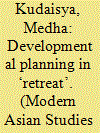| Srl | Item |
| 1 |
ID:
139686


|
|
|
|
|
| Summary/Abstract |
This article concerns the history of economic planning in India in the late 1960s, when a vigorous debate took place on the institutions, instruments, and ‘personnel’ of developmental planning. Examining the years from 1967 to 1971, this article shows how dramatic attempts were made by warring politicians with the help of technocrats to decentralize economic planning, grant states more fiscal autonomy, and drastically reduce the powers of the Planning Commission. This article examines how these critical economic initiatives unfolded but were ultimately overshadowed by political power struggles in which the planning process and the Planning Commission became important tools in attempts for centralization.
|
|
|
|
|
|
|
|
|
|
|
|
|
|
|
|
| 2 |
ID:
090307


|
|
|
|
|
| Publication |
2009.
|
| Summary/Abstract |
This essay examines the Indias' political leadership's romantic engagement with the idea of developmental planning in post-colonial India between 1947 and 1960. It looks at the experience of planning in India between 1947 and 1960. It explores some of the early ideas about developmental planning and the setting up of the Planning Commission in March 1950. Although there was widespread acceptance of the need for planning there was little consensus on the kind of planning that was required, or how it should be carried out. This essay examines attempts, which were made to institutionalise the planning idea. It looks at the heady ascent of the Planning Commission as the pre-eminent economic decision-making body in Independent India and the debates and contentions that took place in the early years of its formation. It argues that the 1956 foreign exchange crisis marked a climactic moment for planning. Thereafter, as far as economic decision-making was concerned, the locus of power shifted from the Planning Commission to other governmental agencies and the developmental planning process itself came to be over-shadowed by pragmatic economic management pursued by official agencies. Thus, in overall terms, developmental planning failed to establish strong institutional foundations in independent India and, in all this, the experience of the 1950s was formative.
|
|
|
|
|
|
|
|
|
|
|
|
|
|
|
|